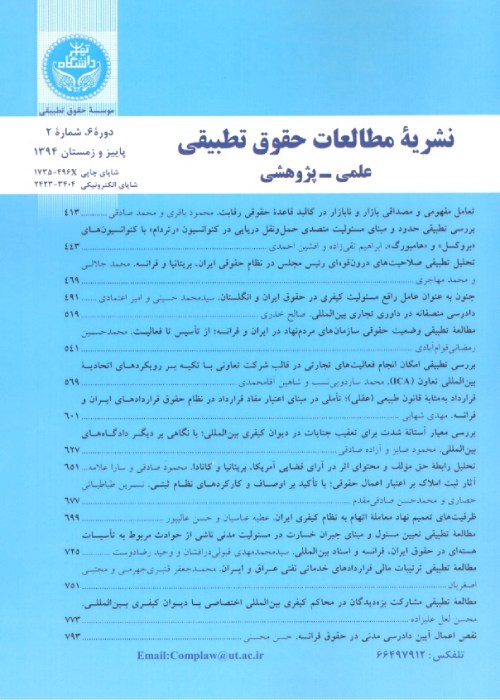Arraignment in Iranian Criminal Law and Judicial Proceeding of European Court of Human Rights (ECHR)
The principles and rules of fair trial as a part of procedural law and human rights established for protecting and guaranteeing the substantive rights that are recognized in the international and national laws and documents. This law so called fair proceeding principles is rooted in human dignity and should be protected by the governments. Administrating the justice, the aim of each proceeding, isn't possible without establishing a fair trial in which rights and freedom of accused person and other people involved in proceeding process are respected. Fulfilling the right of questioning of the judicial system from the person based on the presumption of knowing him “moral agent” causes him to be summoned for criminal investigation. This summons requires that the criminal charge be explained to him in a detail and clear, unambiguous and comprehensible language, and not that the charge be stated and that the criminal title and the relevant article be only read to him. Relying on the defenses of the suspect or accused and assessing their credibility and value depends on the fact that he has a good understanding of what he is accused of. In order to prevent the nature of the summons or detention from changing into an illegal and unjustified act, the charge must be clearly and completely arraigned to him as soon as possible, by stating the reason for his summons or arrest, and his judicial rights must be reminded to him. In the meantime, if the accused is not aware of the language of the summoning authorities, he has the right to use a free interpreter to defend himself in all respects. Fulfilling arraignment and its elements and characteristics on the presumption of knowing the suspect or accused “moral agent” and also on the principle of innocence, as well as the important effects and consequences of guaranteeing this right in order to achieve a fair trial, has caused international human beings, both general and specific, as well as in domestic laws of countries to be specified and emphasized and their implementation to be ensured by the judicial systems of governments. This article examines the arraignment in the judicial proceeding of the European Court of Human Rights by comparing it with its place in Iranian criminal procedure. The main question of this study is “how was guaranteed the right of arraignment as one of the essential rights of defendant by European Court of Human Rights and Criminal Procedure Act of Iran? The European Convention on Human Rights, as a continental treaty, recognizes arraignment as one of the most important principles of criminal procedure and has obliged member governments to fully implement it. The European Court of Human Rights, as the judicial body of this convention, in its procedure, has acted with great obsession on the most detailed rights of litigants, especially arraigning the accused, and has precise and thought-provoking rulings, as far as it can be claimed that all conceivable rights for litigants in the litigation process, is carefully and strictly considered by the Court. In this regard, the full attention of the court to the principle of arraigning the accused in its judicial procedures, including attention to the concept and nature of the arraignment, its promptness and completeness, as well as attention to the accused in terms of familiarity with the language of the accusation and consequently getting a free translator familiar with legal issues to inform arraign who are unfamiliar with the language of the accusation in charge, has resulted in a fair trial, especially from the outset, to be under the strict control of a district judicial body whose order are of high executive guarantee. The court, with full seriousness in this case, has tried to guarantee this important principle of the trial as much as possible so that the most important right of the accused is not violated. On the other hand, in the Iranian criminal law system, the Code of Criminal Procedure, in order to protect the defense rights of the accused, has identified, emphasized and guaranteed the principles of the trial, including the arraignment. However, this right has not been fully identified and defined in such a way that the detailed accusation has been replaced by explicit arraignment and the right to have a “free” translator has not been provided for the accused. Having a translator free of charge is a guarantee for a fuller arraignment, not merely identifying the right to have a translator. An accused who is unable to pay for the translator may be practically deprived of this right. It seems that the drafters of this Act did not pay enough attention to the close connection between the right to have a translator and the right to be arraigned, otherwise all the stages of the investigation, including the investigation of the officers and the prosecutor’s office and the court, would not be neglected. Paying attention to the procedures of international criminal institutions, including the above-mentioned Court, and in particular the principles on the basis of which the Court obliges member states to compensate damages to defendants or convicts and considers the actions of those countries in violation of the Convention to understand the importance of this right in all procedures are required. It seems that in addition to reforming criminal laws and regulations, basic education of these important rights and also further guaranteeing this right during the trial, including through, can be very effective in eliminating the shortcomings in Iranian criminal law.
- حق عضویت دریافتی صرف حمایت از نشریات عضو و نگهداری، تکمیل و توسعه مگیران میشود.
- پرداخت حق اشتراک و دانلود مقالات اجازه بازنشر آن در سایر رسانههای چاپی و دیجیتال را به کاربر نمیدهد.



